MUNICH CHAPTER - 02/13/2012
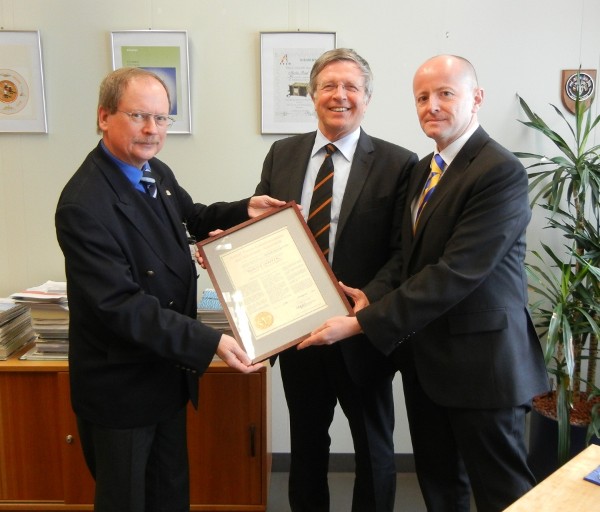 In February, Markus Reigl, chapter president, left his position, which he held for more than 10 years. Klaus-Peter Treche, president of AFCEA Europe, was present as he turned over the role to his successor, Theodor Kowalski. Kowalski received the authenticated founding charter of the chapter dated August 1987. During Riegl's 10 years in office, he developed the chapter into a lively community of more than 120 individual members and many corporate sponsors. The new president, Kowalski, has a professional track record in the German Air Force. Treche thanked Reigl for his excellent leadership achievements and wished his successor Kowalski good fortune for his term in office.
In February, Markus Reigl, chapter president, left his position, which he held for more than 10 years. Klaus-Peter Treche, president of AFCEA Europe, was present as he turned over the role to his successor, Theodor Kowalski. Kowalski received the authenticated founding charter of the chapter dated August 1987. During Riegl's 10 years in office, he developed the chapter into a lively community of more than 120 individual members and many corporate sponsors. The new president, Kowalski, has a professional track record in the German Air Force. Treche thanked Reigl for his excellent leadership achievements and wished his successor Kowalski good fortune for his term in office.
|

|
MUNICH CHAPTER - 03/19/2008
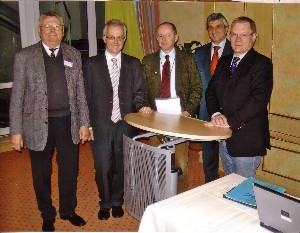 The chapter heard a presentation about the Interoperable Rail Communication System (GSM-R) from Hans Garstenauer, Nokia Siemens Networks, in March. Historically, Garstenauer pointed out, railways usually are still public-owned transportation enterprises employing country-specific communication and signaling technologies. This has resulted in 35 different railway communication systems in Europe alone. GSM-R was established as the European standard for railways in 1996 for strategic planning of future European high-speed train corridors. GSM-R is based on the worldwide mobile telecommunication standard GSM. The standard was supplemented by railway-specific functions and security add-ons to compose GSM-R, Garstenauer explained. Also at the meeting, the chapter reconfirmed the old board for two more years. Markus J. Reigl, chapter president, noted that although the chapter is competing with other similar interest groups, he is confident the number of individual members and corporate spo ... READ MORE
The chapter heard a presentation about the Interoperable Rail Communication System (GSM-R) from Hans Garstenauer, Nokia Siemens Networks, in March. Historically, Garstenauer pointed out, railways usually are still public-owned transportation enterprises employing country-specific communication and signaling technologies. This has resulted in 35 different railway communication systems in Europe alone. GSM-R was established as the European standard for railways in 1996 for strategic planning of future European high-speed train corridors. GSM-R is based on the worldwide mobile telecommunication standard GSM. The standard was supplemented by railway-specific functions and security add-ons to compose GSM-R, Garstenauer explained. Also at the meeting, the chapter reconfirmed the old board for two more years. Markus J. Reigl, chapter president, noted that although the chapter is competing with other similar interest groups, he is confident the number of individual members and corporate spo ... READ MORE
|

|
MUNICH CHAPTER - 02/25/2008
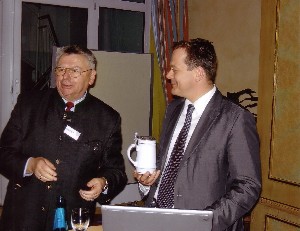 In February, the chapter welcomed Alexander Mager, vice president of business development, strategy and communication, European Satellite Navigation Industries, as keynote speaker. Mager discussed the progress in the European satellite navigation system Galileo. At the end of 2005, the development contract was signed between the European Space Agency and industry participants. The first test satellite, Giove-A, has been successfully launched into orbit, Mager reported. The launch of Giove-B was scheduled for this spring. Satellite control centers in Oberpfaffenhofen, Germany, and Fucino, Italy, are about to become fully operational, while the international test and development facility "GATE" already is in use. The European Commission, the European Parliament and European Union nations agreed on public-funded financing of the Galileo project. The agreement currently calls for launching up to 30 satellites into orbit by 2013.
In February, the chapter welcomed Alexander Mager, vice president of business development, strategy and communication, European Satellite Navigation Industries, as keynote speaker. Mager discussed the progress in the European satellite navigation system Galileo. At the end of 2005, the development contract was signed between the European Space Agency and industry participants. The first test satellite, Giove-A, has been successfully launched into orbit, Mager reported. The launch of Giove-B was scheduled for this spring. Satellite control centers in Oberpfaffenhofen, Germany, and Fucino, Italy, are about to become fully operational, while the international test and development facility "GATE" already is in use. The European Commission, the European Parliament and European Union nations agreed on public-funded financing of the Galileo project. The agreement currently calls for launching up to 30 satellites into orbit by 2013.
|

|
MUNICH CHAPTER - 06/07/2007
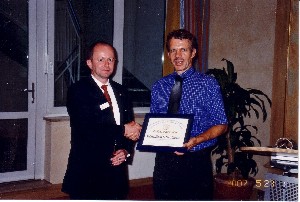 Wolfgang Zirwas, Nokia-Siemens-Networks Munich Germany, spoke at the chapter's June event about cooperative antenna systems. New applications in image transmission and video previews will require data transmission rates much higher than legacy mobile communication systems can provide. According to the plans of the 3G LTE standardization body, more than 100 Mbit/sec shall be provided by next generation of mobile networks. Those data rates are only achievable by multiple antenna systems with which several parallel data streams are received, Zirwas said. In fourth-generation systems, being presently investigated in the project IMT Advanced, even 1 Gbit/s are targeted.
Wolfgang Zirwas, Nokia-Siemens-Networks Munich Germany, spoke at the chapter's June event about cooperative antenna systems. New applications in image transmission and video previews will require data transmission rates much higher than legacy mobile communication systems can provide. According to the plans of the 3G LTE standardization body, more than 100 Mbit/sec shall be provided by next generation of mobile networks. Those data rates are only achievable by multiple antenna systems with which several parallel data streams are received, Zirwas said. In fourth-generation systems, being presently investigated in the project IMT Advanced, even 1 Gbit/s are targeted.
Thereby cooperative multiple-input, multiple-output antenna systems, also called MIMO, allow signals from several base stations to be processed in a common digital signal processing unit for best exploiting signal statistics. Processing gains of several 100% are achievable, the author stated. Zirwas' research team ... READ MORE
|

|
MUNICH CHAPTER - 05/20/2007
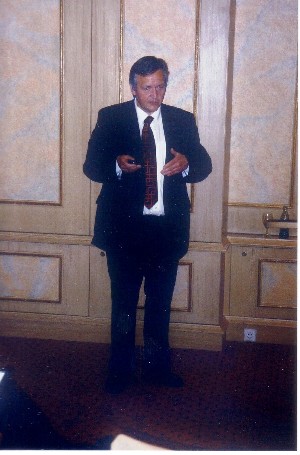 In May the chapter met to hear Dr. Hans-Joachim Kolb, chief executive officer of MEDAV Ltd, Uttenreuth Germany, to speak about speech recognition technologies for reconnaissance applications. Those technologies have been subject to research and theoretical discussion for many years. Now applications are available which can significantly enhance human reconnaissance processing, Kolb stated. By combining unstructured voice data with structured meta data being deduced from the recognition process, subsequent signal processing like language recognition, speaker classification and key word recognition can be automated. So pre-processing of huge amount of data is feasible for final evaluation by human voice analysts. Kolb presented the theoretical background of the applied technolgy and solution in use. Although there are still limits and restrictions which prevent fully automated speech recognition, the performance of those systems will improve with computer power in the future, the a ... READ MORE
In May the chapter met to hear Dr. Hans-Joachim Kolb, chief executive officer of MEDAV Ltd, Uttenreuth Germany, to speak about speech recognition technologies for reconnaissance applications. Those technologies have been subject to research and theoretical discussion for many years. Now applications are available which can significantly enhance human reconnaissance processing, Kolb stated. By combining unstructured voice data with structured meta data being deduced from the recognition process, subsequent signal processing like language recognition, speaker classification and key word recognition can be automated. So pre-processing of huge amount of data is feasible for final evaluation by human voice analysts. Kolb presented the theoretical background of the applied technolgy and solution in use. Although there are still limits and restrictions which prevent fully automated speech recognition, the performance of those systems will improve with computer power in the future, the a ... READ MORE
|

|
MUNICH CHAPTER - 02/01/2007
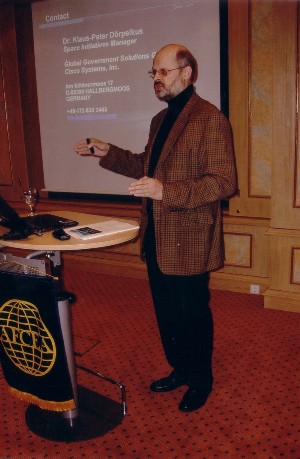 In February the chapter hosted Dr. Klaus-Peter Dörpelkus, space initiatives manager EMEA, Cisco Systems Global Defence, Space and Security, to discuss Internet Protocol in space. After geostationary communication satellites with transponders have been in space for more than 30 years, technological advances in microelectronics now allow the deployment of switch functionality into space. The vision: the Internet in space. According to Doerpelkus, Cisco Systems, a producer of Ethernet switches and IP routers, teamed with a British satellite manufacturer to create CLEO (Cisco router in Low Earth Orbit). CLEO is a low-orbit mini satellite with an integrated commercial router prepared for space with minor hardware modifications. Doerpelkus acquainted the AFCEANs with the concept and mission, saying that the results are encouraging for further plans like an embedded IP-routing segment in space, which would offer opportunities for network-centric military operations and also for civil and c ... READ MORE
In February the chapter hosted Dr. Klaus-Peter Dörpelkus, space initiatives manager EMEA, Cisco Systems Global Defence, Space and Security, to discuss Internet Protocol in space. After geostationary communication satellites with transponders have been in space for more than 30 years, technological advances in microelectronics now allow the deployment of switch functionality into space. The vision: the Internet in space. According to Doerpelkus, Cisco Systems, a producer of Ethernet switches and IP routers, teamed with a British satellite manufacturer to create CLEO (Cisco router in Low Earth Orbit). CLEO is a low-orbit mini satellite with an integrated commercial router prepared for space with minor hardware modifications. Doerpelkus acquainted the AFCEANs with the concept and mission, saying that the results are encouraging for further plans like an embedded IP-routing segment in space, which would offer opportunities for network-centric military operations and also for civil and c ... READ MORE
|

|

 Wolfgang Zirwas, Nokia-Siemens-Networks Munich Germany, spoke at the chapter's June event about cooperative antenna systems. New applications in image transmission and video previews will require data transmission rates much higher than legacy mobile communication systems can provide. According to the plans of the 3G LTE standardization body, more than 100 Mbit/sec shall be provided by next generation of mobile networks. Those data rates are only achievable by multiple antenna systems with which several parallel data streams are received, Zirwas said. In fourth-generation systems, being presently investigated in the project IMT Advanced, even 1 Gbit/s are targeted.
Wolfgang Zirwas, Nokia-Siemens-Networks Munich Germany, spoke at the chapter's June event about cooperative antenna systems. New applications in image transmission and video previews will require data transmission rates much higher than legacy mobile communication systems can provide. According to the plans of the 3G LTE standardization body, more than 100 Mbit/sec shall be provided by next generation of mobile networks. Those data rates are only achievable by multiple antenna systems with which several parallel data streams are received, Zirwas said. In fourth-generation systems, being presently investigated in the project IMT Advanced, even 1 Gbit/s are targeted.  In May the chapter met to hear Dr. Hans-Joachim Kolb, chief executive officer of MEDAV Ltd, Uttenreuth Germany, to speak about speech recognition technologies for reconnaissance applications. Those technologies have been subject to research and theoretical discussion for many years. Now applications are available which can significantly enhance human reconnaissance processing, Kolb stated. By combining unstructured voice data with structured meta data being deduced from the recognition process, subsequent signal processing like language recognition, speaker classification and key word recognition can be automated. So pre-processing of huge amount of data is feasible for final evaluation by human voice analysts. Kolb presented the theoretical background of the applied technolgy and solution in use. Although there are still limits and restrictions which prevent fully automated speech recognition, the performance of those systems will improve with computer power in the future, the a ... READ MORE
In May the chapter met to hear Dr. Hans-Joachim Kolb, chief executive officer of MEDAV Ltd, Uttenreuth Germany, to speak about speech recognition technologies for reconnaissance applications. Those technologies have been subject to research and theoretical discussion for many years. Now applications are available which can significantly enhance human reconnaissance processing, Kolb stated. By combining unstructured voice data with structured meta data being deduced from the recognition process, subsequent signal processing like language recognition, speaker classification and key word recognition can be automated. So pre-processing of huge amount of data is feasible for final evaluation by human voice analysts. Kolb presented the theoretical background of the applied technolgy and solution in use. Although there are still limits and restrictions which prevent fully automated speech recognition, the performance of those systems will improve with computer power in the future, the a ... READ MORE
 In February the chapter hosted Dr. Klaus-Peter Dörpelkus, space initiatives manager EMEA, Cisco Systems Global Defence, Space and Security, to discuss Internet Protocol in space. After geostationary communication satellites with transponders have been in space for more than 30 years, technological advances in microelectronics now allow the deployment of switch functionality into space. The vision: the Internet in space. According to Doerpelkus, Cisco Systems, a producer of Ethernet switches and IP routers, teamed with a British satellite manufacturer to create CLEO (Cisco router in Low Earth Orbit). CLEO is a low-orbit mini satellite with an integrated commercial router prepared for space with minor hardware modifications. Doerpelkus acquainted the AFCEANs with the concept and mission, saying that the results are encouraging for further plans like an embedded IP-routing segment in space, which would offer opportunities for network-centric military operations and also for civil and c ... READ MORE
In February the chapter hosted Dr. Klaus-Peter Dörpelkus, space initiatives manager EMEA, Cisco Systems Global Defence, Space and Security, to discuss Internet Protocol in space. After geostationary communication satellites with transponders have been in space for more than 30 years, technological advances in microelectronics now allow the deployment of switch functionality into space. The vision: the Internet in space. According to Doerpelkus, Cisco Systems, a producer of Ethernet switches and IP routers, teamed with a British satellite manufacturer to create CLEO (Cisco router in Low Earth Orbit). CLEO is a low-orbit mini satellite with an integrated commercial router prepared for space with minor hardware modifications. Doerpelkus acquainted the AFCEANs with the concept and mission, saying that the results are encouraging for further plans like an embedded IP-routing segment in space, which would offer opportunities for network-centric military operations and also for civil and c ... READ MORE

